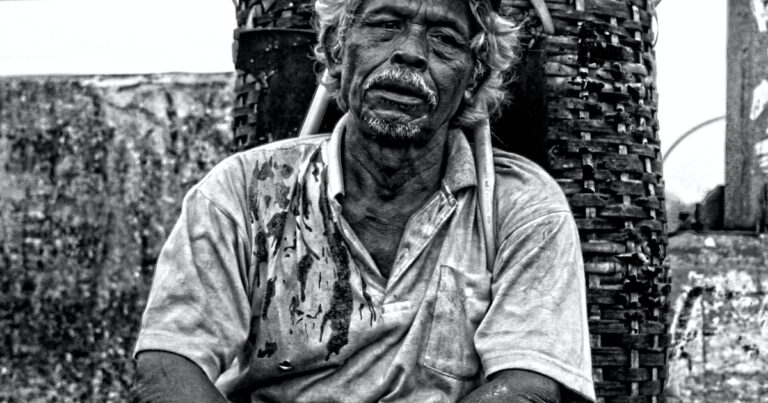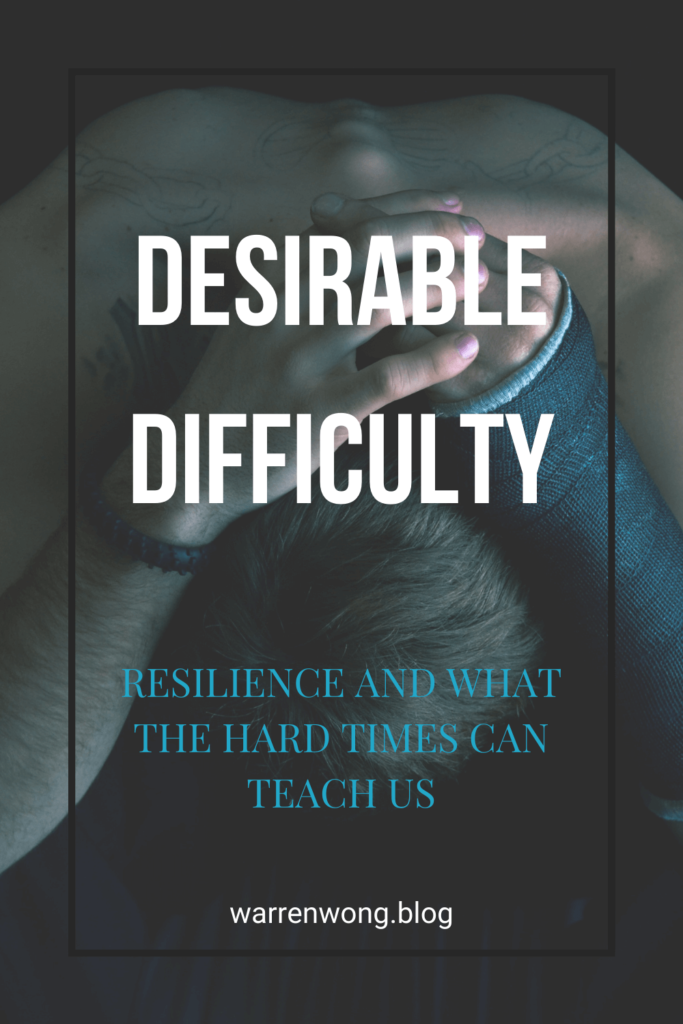Desirable Difficulty: Resilience And What The Hard Times Can Teach Us
5 minute read · By Warren Wong
What does having dyslexia and losing a parent at a young age have in common? Can they make you stronger and even more successful? I know, it sounds ludicrous. Today we are going to look into the possible benefits of difficult circumstances, the studies, and how resilience factors in.

In Malcolm Gladwell’s book, David and Goliath: Underdogs, Misfits, and the Art of Battling Giants, he argues desirable difficulty, can be very beneficial to long term performance.
Desirable difficulty isn’t something we can always control. Sometimes it’s happenchance, other times we choose it; but one thing that is prevalent, is that they undoubtedly produce more resilient folks.
What is desirable difficulty?
Desirable difficulty is a term given to educational practices that make learning more difficult, but are more effective for long term performance. By doing hard things, they make you better.
Most would agree that learning difficult subjects like physics, quantum mechanics, and multivariate calculus will make you smarter, stretch your brain, and make it hurt; but can difficult life circumstances do the same?
What do the studies show?
A study conducted by Julie Logan at the City University of London puts the number of successful entrepreneurs that are dyslexic at just about a third.1 The list includes Richard Branson, Charles Schwab, Steven Spielberg, Whoopie Goldberg — to name just a few.
Multiple historians during their study of successful writers, poets, prime ministers and even presidents found a surprising observation.
Historian Lucille Iremonger discovered that in her sample of British Prime Ministers, that sixty-seven percent lost a parent before the age of sixteen.2 This same pattern is found in American presidents, where twelve of the first forty-four lost their fathers while they were young.
Although I wouldn’t be doing the research justice, without noting that with the amount of “success stories”, that there are just as many defeats.
According to the Minnesota Psychological Association the implications of father-absent homes has drastically led to increase of children that face issues such as depression, suicide, drug abuse, and run in with the law.3
Psychiatrist Felix Brown found that prisoners are two and three times more likely to have lost a parent in childhood than the rest of the population.
Brown writes,”this is not an argument in favour of orphanhood…but the existence of these eminent orphans does suggest that in certain circumstances a virtue can be made of necessity.”
I would argue that orphanhood and dyslexia is a double edged sword. There are cases where those afflicted with these circumstances rise to the highest echelons of society, but there are those that also fall to the wayside, and into our criminal justice system.
What can the hard times teach us?
I firmly believe that the human potential is vast. We rise to the challenges that are put in front of us or we crumble in their shadows.
The men and women of the Second World War have often been called the “greatest generation”, coined by American Journalist Tom Brokaw.
Were these men and women of a different genetic makeup then us or did they simply rise to the occasion?
They faced difficult times, there is no argument on that. But looking more closely into the finer details, it was a classic desirable difficulty scenario (maybe not so desirable), and it required the wherewithal of average U.S. citizens to rise to the occasion and play their role.
On resilience
Psychologists define resilience as the process of adapting well in the face of adversity, trauma, tragedy, threats or significant sources of stress — such as family and relationship problems, serious health problems, or workplace and financial stressors.

What can these stressors do for us? Can they make us stronger? Perhaps you’ve heard of stories from cancer survivors or people who’ve had a near death experience; common amongst them is a new outlook on life and resiliency.
There are circumstances that we can not control. No one chose to be fatherless, diagnosed with cancer or affected by a learning disorder. But how we choose to respond is within our control.
Dyslexia forced Tom Cruise to work harder and smarter than those around him. Barack Obama faced the emotional turmoil of an absent father, after his parents divorced, which led to a less than ideal life growing up.
However, through the tribulations that both these men faced, it formed the backbone of their character and engendered the support and love of the American people, and ultimately, their success.
What can I do to be more resilient?
Find the benefits of past challenges and failures. By reflecting on past failures, you can rationally and logically find ways to improve in the future. Rather than focusing on just the outcome, focus on the steps on how you reached it, and where you can improve.
Remove the mental barriers. Oftentimes, our greatest setback is ourselves, our overactive imagination, and the need to be perfect. Combat this by being prepared. Ensure that you are adequately preparing for the challenges to come, reducing worry, and overthinking.
Find a support group. You are not alone. There are many groups out there that can lend a helping hand and a safe space to share your story. By connecting with others, you are opening up a dialogue and finding a purpose to push on when the going is tough.
Conclusion
Desirable difficulty seems just opposite of that, undesirable. But, if there’s anything that the studies have shown is that through the hard times you can build resilience and become more effective in long-term performance.
If we can turn hard times into a source of power then we can tap into a wealth of potential.
Question for you
What is something difficulty that you have been putting off, but will be beneficial for your long term well-being?

Footnotes
- Standing, Lionel & Aikins, Shari & Madigan, Brent & Nohl, Willa. (2015). Exceptional achievement and early parental loss: the phaeton effect in American writers, presidents, and eminent individuals. The Journal of psychohistory. 42. 188-99.
- Standing, Lionel & Aikins, Shari & Madigan, Brent & Nohl, Willa. (2015). Exceptional achievement and early parental loss: the phaeton effect in American writers, presidents, and eminent individuals. The Journal of psychohistory. 42. 188-99.
- Brown, Jerrod. “Father-Absent Homes: Implications for Criminal Justice and Mental Health Professionals.” Minnesota Psychological Association.